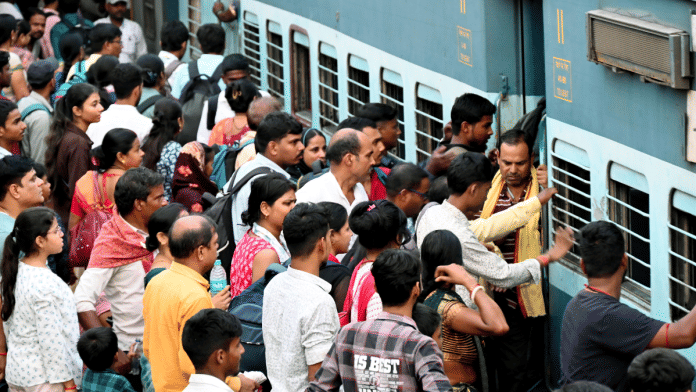New Delhi: In a relief to a family locked in a 19-year dispute, the Madhya Pradesh High Court has ordered the Railways to pay Rs 8 lakh in compensation for the death of a passenger who fell from a crowded train in 2006.
Holding the Railways liable for “contributory negligence”, the court said that its failure to control ticketless travel created conditions that endangered the lives of lawful passengers.
‘Contributory negligence’ is a principle applied to situations where more than one party’s conduct contributes to an injury, and liability is determined based on each party’s share of fault.
“The sanctity of a ticketed journey must be upheld by strict enforcement of access controls and regular monitoring. Any omission in this regard cannot be condoned, especially when it results in loss of innocent life,” the court said.
Justice Himanshu Joshi rejected the Railways’ argument that the deceased, Gurmeet Singh, was not a “bona fide passenger”, saying the absence of a ticket cannot by itself prove that a person was travelling illegally.
The order came in response to an appeal filed by Gurmeet’s father Vijay Singh Gour under the Railway Claims Tribunal Act, 1987, after the Railway Claims Tribunal (RCT) in Bhopal dismissed his plea for compensation in 2011.
What was the case, what did the court consider and how did it apply the principle of ‘contributory negligence’? ThePrint explains.
Case background
In November 2006, Gurmeet was travelling to Durg when, according to witnesses, he fell from the train due to overcrowding and jerks in the compartment.
A co-passenger later gave a statement that Gurmeet was pushed by the crowd as the train moved. The police report confirmed he died due to fall from the moving train.
The family’s claim was based on Section 124A of the Railways Act, 1989, which provides for compensation in accidental death. But the RCT rejected it in 2011, holding that Gurmeet was not a bona fide passenger as no ticket was recovered, only a Railway Identity Card.
Identity cards, when paired with season passes, are used for regular train travel.
The Railways supported their contention with a Divisional Railway Manager (DRM) report, which even alleged forgery of the train ticket.
The 2007 report said Vijay Singh Gour’s complaint had “brought false claim” before the Railway administration. “It is clear case of false claim and a case of forgery. Hence, Railway is not responsible for above claim,” the report said.
The family subsequently challenged the RCT’s order before the High Court. They argued that Gurmeet was a regular commuter who held a valid season ticket at the time of travel.
‘Requirement of being a ‘bona fide passenger”
The court found that the DRM report was “of no use,” saying such reports must be filed within 60 days, whereas this one came after 12 months. The court, therefore, observed that Gurmeet must be treated as a bona fide passenger.
It also said that it is the responsibility of the Railways to ensure that only valid ticket holders are on board, adding that the staff failed in their “duty of care and supervision” to their passengers.
“The Railways being a public utility service and an instrumentality of the State, owe a statutory and constitutional duty to ensure the safety and security of passengers traveling on its network,” the court observed.
Under Section 124A of the Railways Act, the Railways must pay compensation for an ‘untoward incident’, such as accidental death of a passenger. A ‘passenger’ includes one with a valid ticket, platform ticket or railway employee on duty.
The only exceptions to this compensation are suicide, self-inflicted injury, own criminal act, acts during intoxication or insanity, or death due to other natural causes or diseases.
The court cited the Supreme Court in the 2019 Rina Devi vs Union of India case on a compensation claim for a death due to a fall from a train. The ruling stated that when no ticket is found on a deceased passenger, the claimant may prove lawful travel through other evidence, such as an affidavit, identity proof, regular use and witness statements.
Once such material is produced, the burden shifts to the Railways to disprove such statements.
Applying this principle, the HC said the family discharged its burden by filing an affidavit, producing Gurmeet’s identity card, and presenting a witness. This shifted the burden of proof onto the Railways.
Contributory negligence & public bodies
The courts have treated the Railways as a public utility with a heightened duty of care. When accidents occur in overcrowded trains, courts have repeatedly held that the Railways’ systemic failure to control crowding and check ticketless travel is the dominant cause of the harm.
For instance, in the 2010 Jameela vs. Union of India case, the Supreme Court rejected the Railway’s allegation that the deceased was standing negligently at the door, calling it “entirely based on speculation,” and held that even if a passenger falls from a train because of his negligence the Railways remain liable under Section 124A unless they prove one of the exceptions.
This reasoning that public bodies have a heightened duty of care has previously appeared in cases such as the 1966 Municipal Corporation of Delhi vs Subhagwanti case. In this instance, an MCD clock tower collapse led the Supreme Court to uphold a lower court’s findings on a public authority’s failure to maintain the structure and awarded compensation.
The approach is consistent with foreign jurisdictions. For instance, many common law jurisdictions, including the UK, apply comparative negligence principles to apportion liability rather than deny compensation entirely.
Similarly, most US states follow “comparative negligence”, where the victim’s share of fault reduces compensation but does not eliminate it.
Akshat Jain is a final-year student at the National Law University, Delhi and is a contributor with ThePrint
(Edited by Sugita Katyal)






